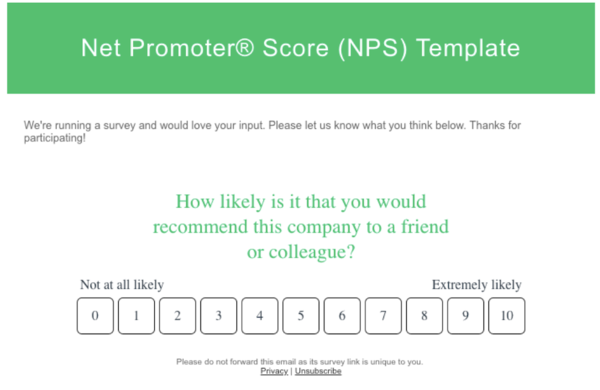Product Management
Don't use NPS to measure user happiness for enterprise software
7 Sep 2020
Net Promoter Score (NPS) has become the standard metric for gauging customer satisfaction and loyalty. Ask people to rate from 0 to 10 the question, "how likely are you to recommend this product to a friend or colleague?" There are a ton of valid criticisms of the metric and methodology, but for enterprise software, there’s an extra problem.
The NPS question is not relevant to the end users the software they don’t buy.
Does it matter to the future of your expense management software if an entry-level outside sales rep at your customer would recommend your software?
The end user isn’t choosing the software, some IT buyer at their company is. For most business software, the end user does not influence the buying decisions, so a recommendation from them to another end user is meaningless.
Users instinctively understand this. I once worked with a product that had very high Promoter scores. Except for a cohort of German customers. German customers almost all answered 1 or 2 where most other customers were in the 8 to 10 range on the zero-to-ten scale.
When we asked the German customers what was wrong with the product, they said they loved it. Then why the low NPS? None of their friends were in the same industry, and all their colleagues already used the software. A recommendation would be useless and they saw no reason they would make such a recommendation.
When we did some cohort analysis of our NPS we found that our Promoter scores were much higher among administrators and buyers than we’d realized.
Likewise, you could have all the end users enjoy using your software and give you a high score, but the handful of people responsible for purchasing and operating the software give you a low score because it’s expensive and difficult to operate. You’d have a high NPS but lose the customer.
NPS might be a useful metric for the buyers of the software. For those that actually would recommend buying it at a future company or to their colleagues at other businesses.
Yet, to truly understand if the product is meeting the needs of the end user I like to ask a different question, the Sean Ellis Test.
"How disappointed would you be if you could no longer use this product?"
You’re asking them to imagine a future state where this product doesn’t exist. Where they have to go back to the old way of doing their work.
Asking this way is different than asking, "how satisfied are you" because you’re giving them something to compare it to. Satisfaction is relative to the situation, so you get a better answer by anchoring the situation.
You can use whatever scale you want for the answers. Using the same scale and method you use for NPS might make sense if you’re trying to create a blended metric.
The scale I like to use is a simple one: extremely disappointed, a little disappointed, and don’t care.
Unless they make up most of your survey responses, you can ignore those who don’t care about your software. They’re not your ideal user, they may not use the product that much, or they’re using it in ways that you’re not focused on. If this category represents most of your responses, you’d better dig into why. You’re not going to survive very long with an entire customer base that doesn’t use your product much, doesn’t find it valuable, and wouldn’t care if it went away. If you see this pattern at a single customer, you’re not getting a renewal from that customer.
People that would be extremely disappointed to lose your product are your raving fans. Turn them into evangelists. Use them in your adoption campaign at their company. Get them in front of your buyers at the customer. Quote them in case studies.
End users that would be somewhat disappointed to live without your product are an opportunity. They like the product but could live without it. If you want to make your product better, work to convert them into raving fans.
Net Promoter measures decision makers. In enterprise software, the decision makers are far removed from the people using the product. Measuring the satisfaction and enjoyment of those end users is a key to unlocking product-led growth.
 Net Promoter Score (NPS) has become the standard metric for gauging customer satisfaction and loyalty. Ask people to rate from 0 to 10 the question, "how likely are you to recommend this product to a friend or colleague?" There are
Net Promoter Score (NPS) has become the standard metric for gauging customer satisfaction and loyalty. Ask people to rate from 0 to 10 the question, "how likely are you to recommend this product to a friend or colleague?" There are